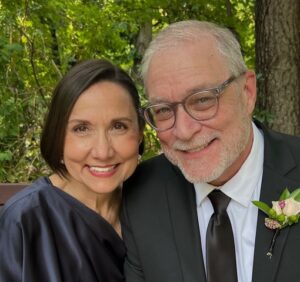Podcast: Play in new window | Download

Authenticity and transparency are important in leadership. When we strip off the varnish and live life according to our own uniqueness we help those we love and lead embrace healing and wholeness in their own lives. In this episode of The Calibrate Life Podcast, David and Donna explore the power of living and leading authentically in their own lives and how they have seen the impact of a willingness to share flaws and imperfections result in trading ashes for joy and beauty.
For extensive time-stamped notes, questions, and tools related to this week’s episode, continue reading below.
Authentic Leadership: Being Real and Lifting Those You Love and Lead
The Challenge of Authentic Leadership [2:00]
Being authentic is sometimes it is a little scary because it can make us feel vulnerable. We want to be authentic, but we are fearful to reveal our flaws and imperfections. Opening up can sometimes be uncomfortable.
Most ministry leaders know about the Monday morning blues. In reflecting back on Sunday ministry we sometimes second guess ourselves in what we said and how we presented ourselves. Often when we feel we may have been too vulnerable or transparent, those are usually the times when we helped people the most. [3:00]
The Power of Authentic Leadership [3:15]
The greatest compliment, I believe, anyone can give us is that we are real. We are the same in the public eye as we are privately. It is especially meaningful when those in closest proximity to us, our family and our loved ones, make this observation.
Authenticity matters because it removes veneers and reveals to people who we really are. Our uniqueness, who we are, is the zone in which God can use us and where we can bring the most value to this world.
The Hinderance to Authentic Leadership [4:21]
Our struggle is often that, perhaps who we are is not good enough, so we try to mask our true self because of this feeling of inadequacy. Sometimes we don’t like who we are. Sometimes we feel unqualified because of the things we’ve done or experienced. Sometimes it is hard to be transparent and “put it all out there.”
How Do You Know When to be Transparent, and When to Just Heal Yourself? [4:44]
As leaders, it is not necessary to share every detail of our lives as we are experiencing it. We must exercise wisdom in how we move forward with transparency.
- Every leader has walked through difficult stuff and has much to share.
- If we are not careful we may inappropriately share before we’ve found wholeness
- We should exercise caution as to the relational circle in which we can share things.
As leaders we must be genuine, but it is better to speak out of our wholeness and our overcoming than to share open wounds while we are still in the process of healing. It is important to have an inner circle of friends with whom you can share your struggles and battles. Then, when you’ve come to a place of wholeness, or at least a healthy degree of wholeness, you can share your scars with those who are facing similar battle for their strengthening and comfort.
How do you know when it is time to be transparent and share? When you are walking and living in confusion, you will share and speak confusion. Such times are not times to open up to those you may hurt, discourage, or further confuse. When you have received at least a measure of clarity, it might be time for you to begin sharing pieces of your story. When you are a overcomer, a survivor, and you can speak from a place of wholeness, then you can bring great help and value to the lives of others through your transparency and authenticity.
The level of relationship is the level to which you can speak into someone’s life. You can be more transparent with a person who knows who you are, understand your context, understands where you are coming from, than you can be with a person you’ve never met before. Gauge whether or not the relationship will sustain the level of transparency in which you intend to communicate.
Our struggles, our experiences, and our stories will be a blessing to others in time. What are the stories, the experiences and the things you have overcome that will help others through your authentic sharing? We will allow our struggles to be redeemed, and out of our experiences we will lift those we love and lead.
We Must First Be Authentic Before God [9:54]
We will find a stronger faith when we are honest and authentic before God. Honesty with God is essential, but he is our Father who can help us through our pain points.
When we are authentic with God and speak the things in our heart to him, it leads us to being honest with ourselves. There is a partnership between being honest with God and being honest with myself.
The Psalms are an example for being authentic before God.
Psalm 25 has encouraged me many times. We believe in God’s ability to do the miraculous, but sometimes we try to take responsibility for what God does and does not do, but Psalm 25 teaches us that integrity and uprightness will protect us and we will not be put to shame. In other words, It is God’s responsibility to do the miraculous, and if our trust is in Him, we can relax and rest in a sincere faith.
An authentic faith is a faith in which we really believe what we are saying. We give God an opportunity to do His work, and our actions are based upon a sincere and authentic faith.
Being God’s had extended in our own uniqueness does not require us to follow a certain formula, to become plastic, or to put on a show.
Authentically Embrace the Uniqueness of Your Journey [16:48]
Others need what you bring to the world. If you mask who you are and lead without authenticity because you are afraid to show your flaws and blemishes, something the world desperately needs from you will not be delivered.
You are flawed, get over it. God works through your imperfections. Those who have not committed their lives to God because they want to get perfect first — that’s not how it works. God works through our imperfections, AND it is God taking the ashes of our lives and turning it into beauty that shows the world that God does help us overcome.
We Must Anchor in an Authentic Faith [18:15]
2 Timothy, chapter 1, verse 5. The Apostle Paul mentors a young man named Timothy. Paul has recognized a sincere faith in Timothy.
- God has called us to sincerity.
- This is an unfeigned faith, one that is not put on, one that is authentic.
- In the Greek New Testament this word for “sincere” is very close to our word “unhypocritical.”
- It is an “unwaxed” faith (see below)
We have doubts, and that is ok, when we embrace our doubts and we live with a sincere faith it increases our ability to lead as a spiritual leader exponentially. If we present ourselves as perfect, then all of the imperfect people out there will not be able to relate to us.
We are to have an “unwaxed” faith. Unscrupulous merchants in ancient times would sell flawed marble sculptures with wax rubbed or melted into the imperfections in the marble. It looks great — until the wax melted. We need to let our imperfections be what they are, allow God to redeem our imperfections, and use those imperfections to help others who are in need of redemption.
Authentic Leadership is Possible Because of the Brokenness We Have Experienced [22:00]
We are valuable in our brokenness because the Master has crafted us. We have value not only because of who we are, but also because of who made us and who loves us. It is out of this authentic faith that we can lift those we love and lead.
I want to follow an experienced leader who has pressed beyond the tough stuff and is experiencing the JOY of living, leading, and loving.
When our lives shatter, and they cannot ever be glued back together in the way they were before, life is not over, we pick up the pieces, we put them back together as best we can, but we find a new purpose in the broken image of our lives. It may never be the same as it was before, but it is still of great value, it is still of great beauty.
You see, when you try to coverup the imperfections and crack caused by the brokenness you’ve experienced, you deny the beauty of who you have become. You deny the world of something special they truly need. You lose the opportunity to love who you’ve become and understand your true value. In these moments we discover our true worth. [26:20]
Authentic Leadership Teaches and Encourages Others to Do the Same. [26:36]
We encourage people to not only be authentic with each other, but with God and themselves.
The Challenge… [27:00]
Be authentic. You don’t have to parade your wounds, but neither will we rub wax into them. We have a great opportunity to lead others in authenticity.
- Embrace who you are.
- Embrace your personality.
- Embrace your gifts.
- Embrace the grace of God.
- Embrace the uniqueness you bring to this world in who you are.

